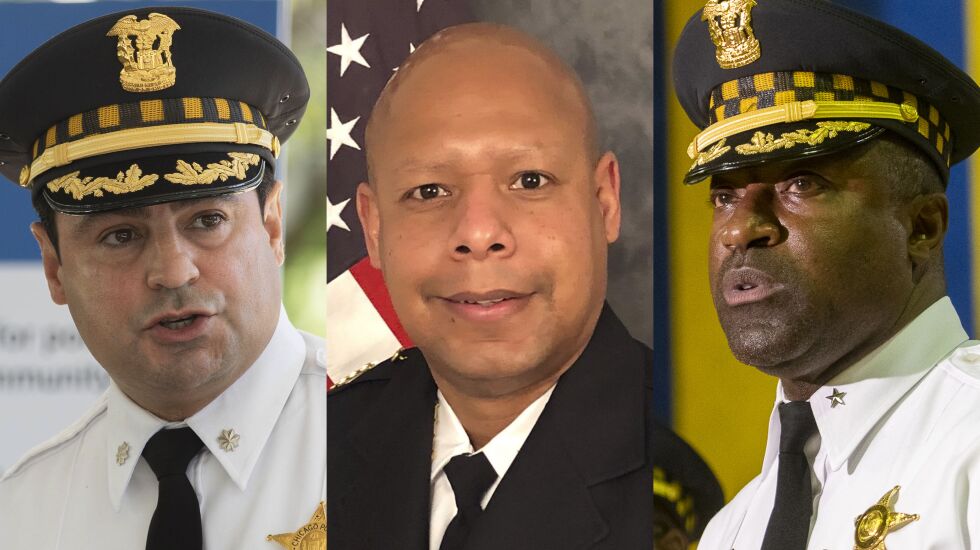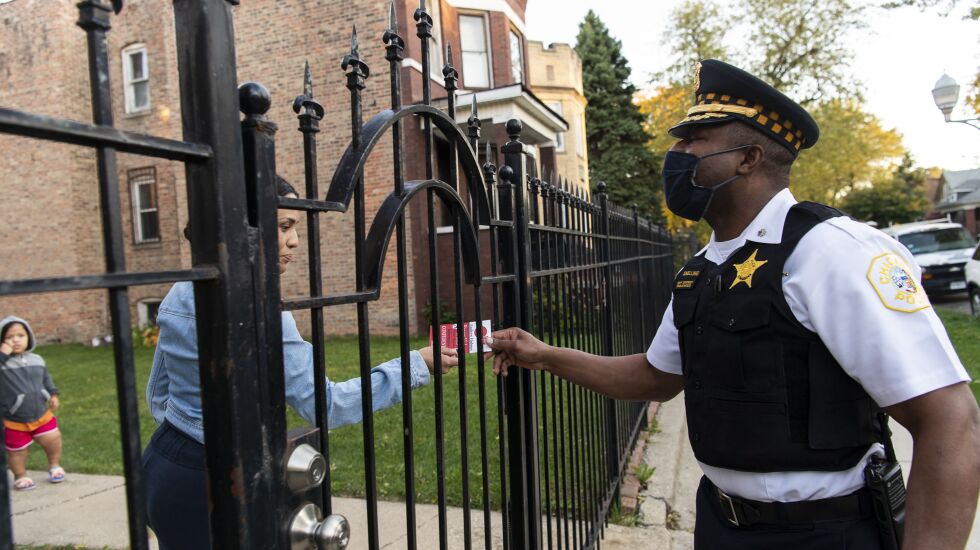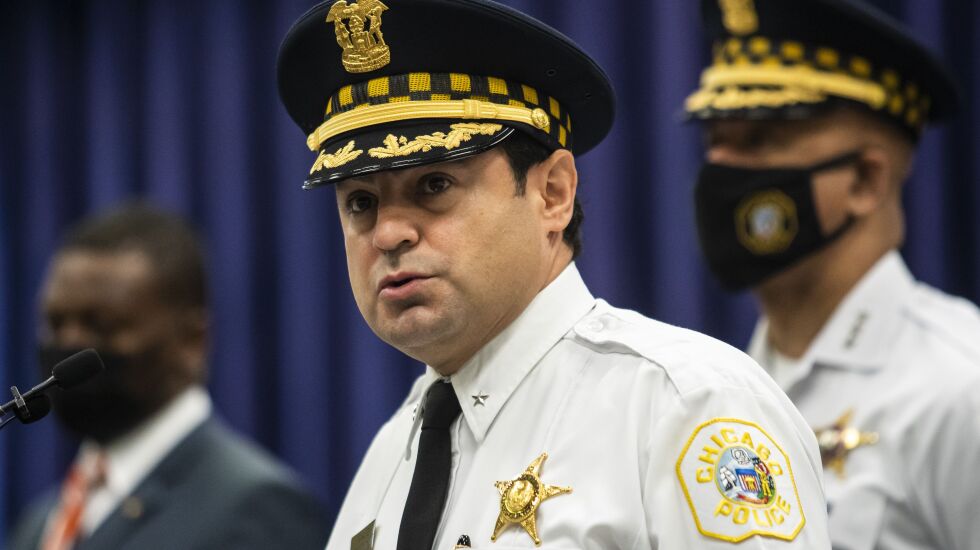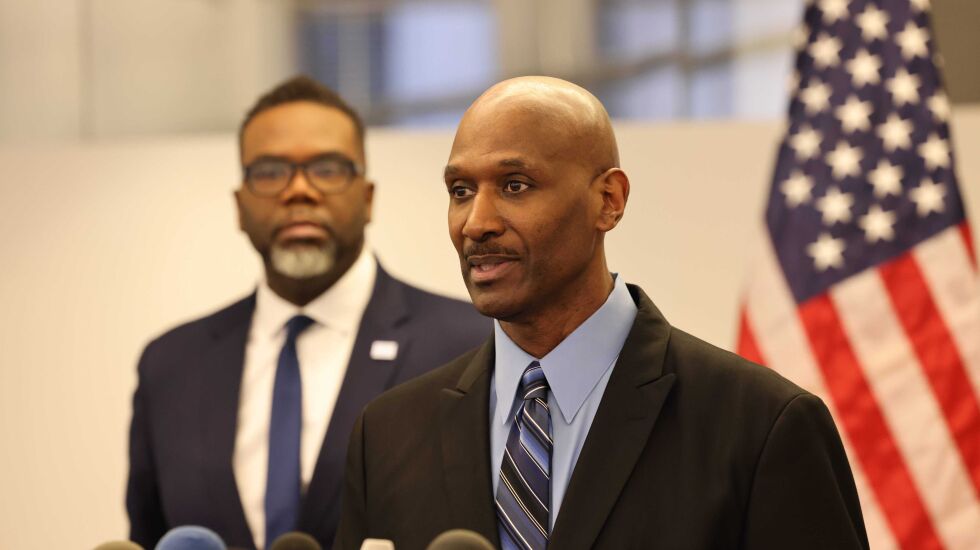
A first-of-its kind search for the Chicago Police Department’s next police superintendent has drawn to a close, with a civilian commission voting Thursday evening to send the names of three finalists to Mayor Brandon Johnson.
The choices for the $260,000-year top cop are: CPD’s Chief of Counterterrorism Larry Snelling; the department’s Chief of Constitutional Policing and Reform Angel Novalez; and Shon Barnes, the police chief in Madison, Wisconsin.
The Community Commission for Public Safety and Accountability’s unanimous vote confirming the finalists marks the conclusion of a four-month nationwide search and starts the 30-day clock for Johnson to make his decision. But he could also reject all three and order the panel to launch a second search to come up with three more.
Prior to the vote, the commission’s president, Anthony Driver, told the crowd at Kennedy-King College in Englewood that his team had engaged with community members, faith leaders, business groups and labor unions as they sought out “courageous and compassionate” options.
“We are looking for a generational leader,” he said, “and we believe that we have found three.”
Johnson has expressed a strong desire to choose interim Supt. Fred Waller’s replacement from inside the department — or at least select someone with experience here. He views an insider as pivotal to boosting morale that hit bottom among the rank-and-file under former Supt. David Brown, who resigned the day after Mayor Lori Lightfoot lost her bid for a second term.
Larry Snelling
If boosting police morale is a priority, Snelling could emerge as a favorite.
He is pretty much beloved among officers in the department and reportedly wowed commission members with his humility.
Snelling was promoted from deputy chief of Area 2 to chief of counterterrorism after the surprise resignation of Ernest Cato III, a semifinalist in this year’s search who didn’t make it to the top three.
Over his more than three decades with the department, Snelling has also served as the commander of the notoriously violent Englewood District and as a sergeant for recruit training at the police academy.

He notably designed the latest version of the police department’s training model on use of force, an integral part of the consent decree outlining the terms of federal court oversight of the department.
Snelling was also a lead trainer ahead of the 2012 NATO Summit, when the police department was widely praised for defusing a potentially volatile confrontation with Black Bloc protesters near McCormick Place.
Snelling’s performance in that situation shows his expertise in constitutional policing. That’s crucial for a department struggling to meet the demands of a consent decree mandating broad changes.
However, he has also been suspended at least twice over his long career. A database compiled by the Invisible Institute shows a use-of-force complaint against Snelling in 1994 triggered a two-day suspension. The following year, Snelling served a five-day suspension for conduct unbecoming. Details of both incidents were not known.
Angel Novalez
If Johnson’s top priority is to speed consent decree compliance to rebuild shattered trust between residents and police in Black and Brown communities, he may be drawn to Novalez.
Novalez is currently charged with creating and implementing policies to meet the demands of that court order, which was put in place in response to the police killing of Laquan McDonald.
Before that, Novalez was the deputy chief of the Office of Community Policing, overseeing the expansion of the department’s Civil Rights Unit and Neighborhood Policing Initiative programs. He was placed in charge of community policing two weeks after civil unrest triggered by the murder of George Floyd that devolved into two devastating rounds of looting.
Two years ago, a program that encourages district coordination officers to engage with residents expanded to 10 districts, as Grand Crossing, Englewood and Gresham were added.
“Rather minor or involved, we want some participation from the community because that will help us build some accountability. Also, it gives people a sense of ownership of their own geography,” Novalez said at a news conference on the expansion.

Nevertheless, a report released last month by Northwestern University researchers concluded the nearly 4-year-old Neighborhood Policing Initiative has fallen short of its goal of strengthening the police department’s relationship with the community and reducing crime.
Shon Barnes
The wild card in the competition to become Chicago’s next police superintendent is Shon Barnes.
He is the only outsider among the finalists, which could be viewed as almost disqualifying after Brown’s disastrous tenure. Still, Barnes has a connection to Chicago.
Before being hired in 2021 as police chief in Madison, Wisconsin, with a population of less than 270,000 people, he worked as the director of training and development at the Civilian Office of Police Accountability. That agency, charged with investigating serious misconduct allegations, is widely derided by rank-and-file officers and their union.
Barnes earned his police stripes as deputy chief in Salisbury, North Carolina, after 17 years in the Greensboro Police Department, where he rose to captain.
In Madison, Barnes was accused of making sexually inappropriate comments to one of his officers during an exit interview. After a thorough investigation, Madison’s Department of Civil Rights cleared Barnes of the woman’s allegations.

During his brief stint at COPA, Barnes served under Chief Administrator Sydney Roberts. She was forced out in May 2021 after Lightfoot publicly ridiculed the slow pace of COPA investigations.
‘We have heard you loud and clear’
During Thursday’s meeting, Driver acknowledged the next top cop has to “grapple with the tarnished legacy of the past while simultaneously charting a new path for the future.” He insisted the superintendent should view the consent decree as “a mandate and a roadmap” and should embrace community oversight and accountability, instead of viewing it as an “impediment.”
“These are not just my words,” he said. “These are some of the things that we heard from the thousands of Chicagoans who we engaged with during this process. And we have heard you loud and clear.”
During a public comment period, many speakers credited the commission’s work and criticized the department’s troubled record.
Resident David White said the issues plaguing the department — misconduct lawsuits and falsified police reports — involve more than just picking the right superintendent.
“Some Chicagoans have expressed the view that the new superintendent needs to be from outside the department,” White said. “The whole department needs to be cleaned out from top to bottom.”
In a diplomatic turn, John Catanzara, president of the Fraternal Order of Police, commended the panel, noting that this was the first time cops were interviewed during the superintendent search process.
“We are not perfect, no different than any other profession. I know my membership. The supermajority of them are out here to do their best for their community every day,” said Catanzara, who wouldn’t back a specific candidate but expressed concerns about an outside hire.
Driver said the commission sought out candidates with the rare combination of experience and skill to “increase public safety, deliver systemwide reform, support officer wellness and build and cultivate deep and lasting trust” in Chicago neighborhoods.
To guarantee public input and cast the broadest possible net, the commission held seven public forums and gathered survey responses from 250 civilians and 270 police personnel. Driver and colleagues spent hours listening to the concerns of rank-and-file police officers who belong to the Fraternal Order of Police. They also met with the sergeants and lieutenants associations.
Input was received from past and present police brass in Chicago and across the nation, other law enforcement experts and academics, outreach workers and members of religious, social service, labor, legal aid and business organizations.
“We wanted to ensure that the selection process was shaped by community input, reflecting a wide range of perspectives. We are grateful for the valuable feedback and insights we received from the diverse range or stakeholders,” Driver said in a news release announcing Thursday’s meeting.
The “extensive and thorough search process ... is a testament to our commitment to finding the most qualified candidates who can effectively lead the Chicago Police Department and address the evolving needs of our city,” Commissioner Remel Terry said in the statement.
A wild card who ‘can crush it’?
Sources close to the selection process said all three finalists impressed commission members with their humility, a pivotal quality for any big-city superintendent.
Snelling, Novalez and Barnes used “we” — not “I” — during interviews with the panel, well aware that teamwork is needed to deliver Chicago from violent crime and rebuild public trust.
All were described as “deeply knowledgeable” and had done their homework, devising specific plans and crime-fighting strategies. That seemed to be lacking under Brown, who, some critics say, lurched from one strategy to another.
Sources said commission members came away “thinking Barnes can crush it” if only Johnson were willing to risk alienating a demoralized rank-and-file that despised David Brown and never believed he understood Chicago or had their backs.
If the strength of a candidate’s response during the lengthy, in-depth interviews were the overriding criteria, Barnes might even be the hands-down choice. He was described as a potentially “transformative” police leader.
During a February 2021 interview with a Madison TV station, Barnes was asked about defunding the police, which Johnson had supported before distancing himself from it during the mayoral campaign.
Barnes responded that “defund that police” has “different meanings, depending on who you ask” and that it is “more about government in general than it is about the police department.”
“There are certain segments of our community that hasn’t seen government work for them the way it’s worked for other people. They’re looking for those same resources. And they see defund the police as a way of getting those resources,” Barnes said.
“But I believe we can do both. We can still have a police department that’s funded to a level that it needs to keep our community safe. And we can prioritize some of the social service needs that we need to make our community safe.”
Barnes also said eliminating racial disparities in policing is “very important to me” after studying the topic for his doctoral dissertation.
More important, though, is understanding how to collect and analyze data and present “the most accurate view of what the result looks like, good or bad” in Madison, a predominantly white college town.
“If we have room for improvement, I won’t hide that from our citizens. I will let them know. But in the meantime, we need to make sure how our strategies and initiatives are affecting our community. We need to be able to test for that regularly. And if we see a disparity start to creep up, we need to change our strategy. The ends sometimes always don’t justify the means,” he said.
As impressive as Barnes’ was, the disadvantages of being an outsider in a city like Chicago and an organization like CPD that eats outsiders for breakfast cannot be overstated.
“So many people would probably not have his back on Day One,” a source said of Barnes.
If Johnson is more interested in making a “safe choice,” Snelling is probably the best bet. He was described as a “vast improvement” over Brown with tremendous potential to rebuild police morale.
The best of both worlds might be to choose Snelling and convince the new superintendent to assemble a team of rivals that includes the younger Barnes as a top deputy or even first deputy with Novalez in another high-ranking role.








